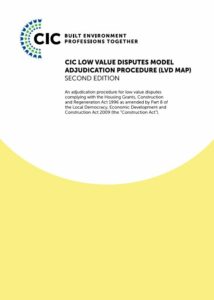Adjudication Nomination Services
CEDR provides two adjudicator nomination services:
- Nominations for Low-Cost Adjudication under the CIC MAP
- Nominations for Construction Act Adjudication

Adjudication is a process designed for businesses to resolve construction contract disputes much more quickly and cost-effectively than through arbitration or litigation.
Under UK law any dispute arising out of a construction contract (for example disputes relating to delay, payment or alleged defective work) may be referred for adjudication.
CEDR is an Adjudicator Nominating Body (ANB) under the Housing Grants Construction and Regeneration Act, 1996 (The Construction Act).
A construction business, sub-contractor or client can apply to CEDR to appoint an independent adjudicator with the necessary specialist expertise to determine the dispute. CEDR maintains a panel of adjudicators with a range of expertise, who are construction industry specialists and meet the requirements for appointments set out by the Construction Industry Council.
CEDR provides two adjudicator nomination services:
CEDR can nominate adjudicators to conduct adjudications under the CIC Low Value Dispute Model Adjudication Procedure (LVD MAP).
The CIC LVD MAP sets out a streamlined adjudication procedure for low value disputes, and by linking the adjudicator’s fee to the amount claimed, provides certainty as to how much the adjudicator charges for making an adjudicator’s decision.
The adjudicator’s fee depends on the value in dispute as set out below. The hourly rate is capped at £250 plus VAT.
|
Dispute value |
Adjudicator’s fee |
|
Up to £10,000 |
£2,000 |
|
£10,001 to £25,000 |
£2,500 |
|
£25,001 to £50,000 |
£3,500 |
|
£50,001 to £75,000 |
£4,500 |
|
£75,001 to £100,000 |
£5,000 |
|
Over £100,000 |
Negotiable* |

CEDR can nominate an adjudicator under the Housing Grants Construction and Regeneration Act, 1996 (The Construction Act).
When applying for the nomination of an adjudicator the Referring Party should ensure that they comply with the requirements of the CIC LVP MAP or the Construction Act as appropriate and provide the following details:
CEDR’s nomination process begins upon receipt of the following:
CEDR will evaluate the information provided and nominate the most appropriate member of our Adjudicator Panel.
Prior to nomination, CEDR will confirm with the prospective Adjudicator that they:
Membership of the CEDR Adjudicator Panel is strictly for highly skilled and trained adjudicators and is by application. The panel is reviewed on an annual basis to ensure CEDR can offer adjudicators with the right skills to match client requirements. If you would like to join CEDR’s panel of construction adjudicators please complete the application form here to confirm that you meet the requirements of panel membership.